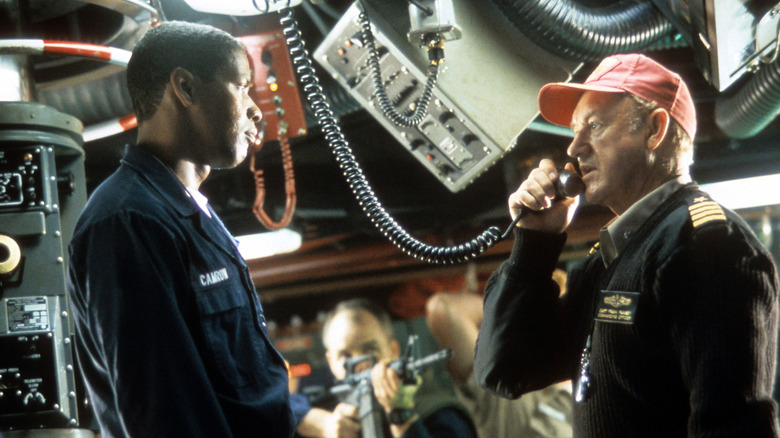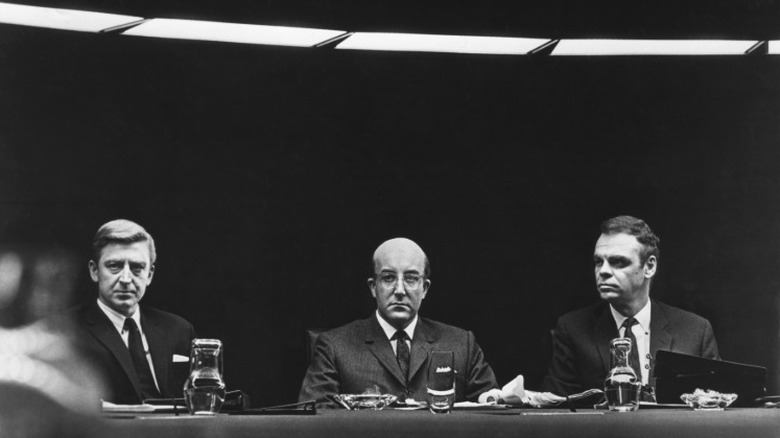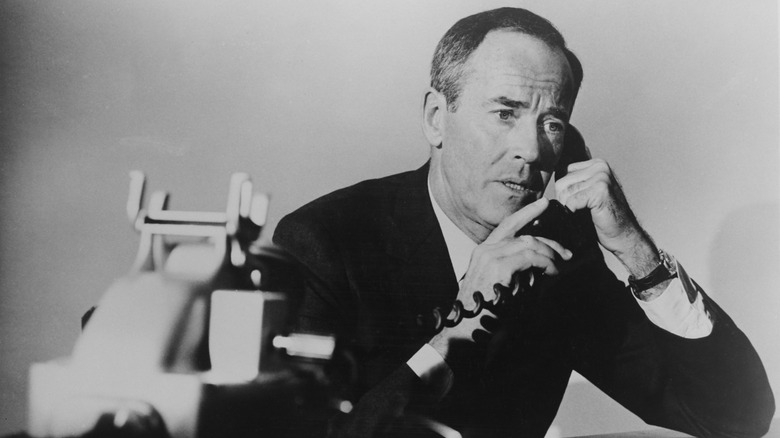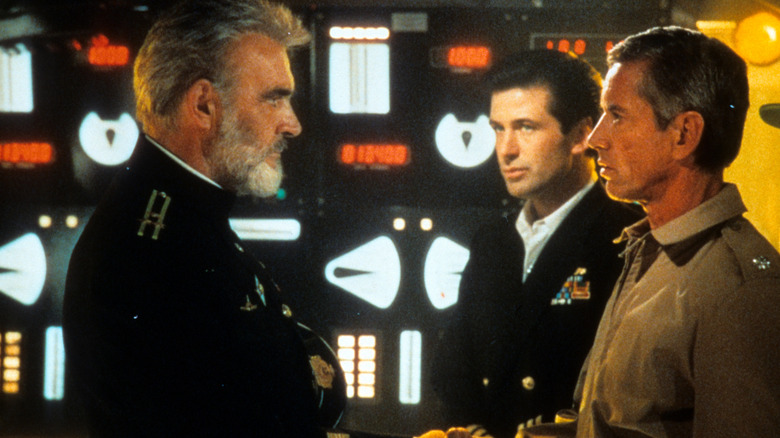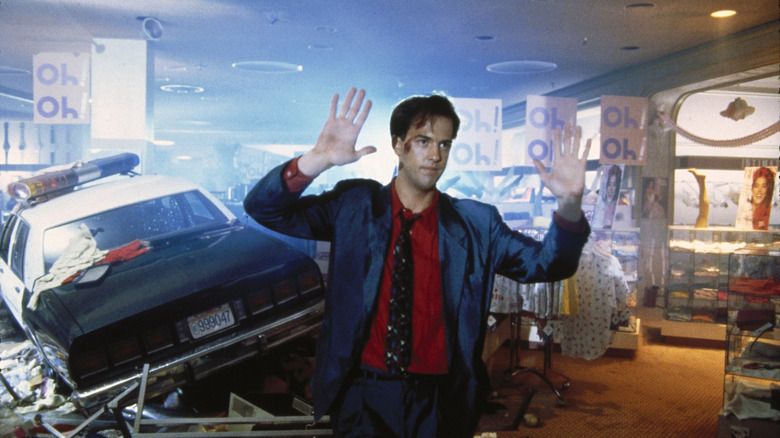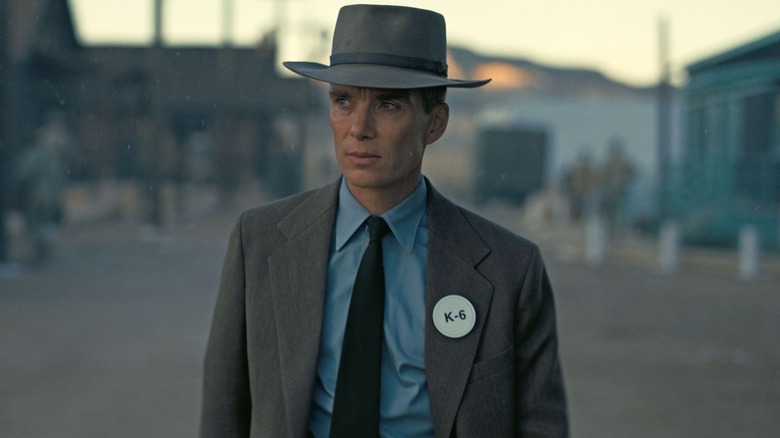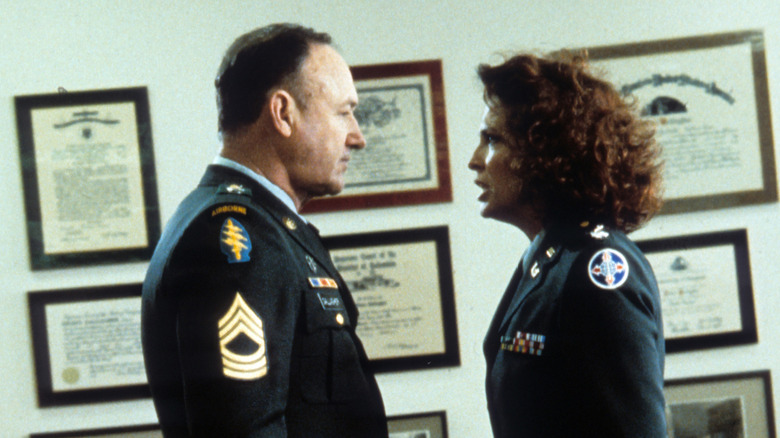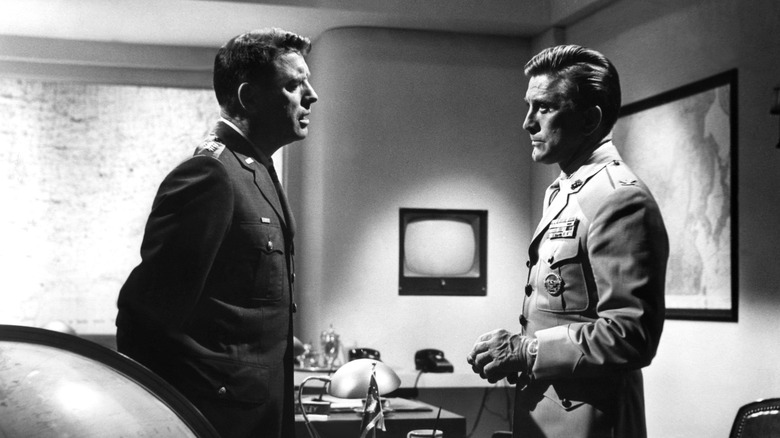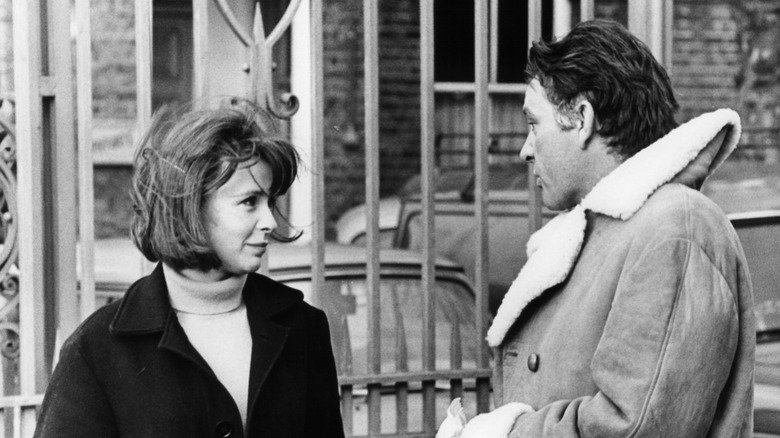10 Best Movies Like A House Of Dynamite
Eight years after her last film, "Detroit," Kathryn Bigelow is back with "A House of Dynamite" on Netflix. As with her prior Iraq War-centric efforts such as "The Hurt Locker" and "Zero Dark Thirty," it's a cinema vérité-style thriller of how American life has changed in the wake of 9/11. As written by Noah Oppenheim, it's a triptych that examines the immediate reactions to a nuclear weapon being launched from an unknown enemy towards Chicago. Unfolding in non-chronological time, it views the same 18-minute event from three different perspectives: White House Situation Room officer Captain Olivia Walker (Rebecca Ferguson), U.S. Strategic Command Combatant General Anthony Brady (Tracy Letts), and the U.S. President (Idris Elba).
As the story unfolds, it becomes clear that there's no preventing or responding to the catastrophic event. Like the best nuclear war films, it shows that the harnessing of such a destructive force is a mistake to begin with, and it's only a matter of time before we make a misstep we come to regret. If you've just finished "A House of Dynamite" and are looking to get your heart rate back up again, fear not. Here are the 10 best movies like "A House of Dynamite," from white-knuckle thrillers to absurdist satires.
Crimson Tide
Although the Cold War has ended, tensions remain high as civil war breaks out in Chechnya, with Russian militants loyal to rebel Vladimir Radchenko (Daniel von Bargen) taking control of a nuclear weapons instillation and threatening to launch missiles if they're attacked. Veteran submarine Captain Frank Ramsey (Gene Hackman) sets sail on the USS Alabama with a new executive officer, Lieutenant Commander Ron Hunter (Denzel Washington). Intent on halting a nuclear war, Ramsey is ready to strike when an incomplete Emergency Action Message is received. Yet Hunter urges caution, leading to a near-mutiny as the two fight for control of the ship and crew.
Like "A House of Dynamite," "Crimson Tide" examines its threat from a military standpoint, with Ramsey advocating a hawkish approach and Hunter pushing for diplomacy. Directed by Tony Scott and produced by Jerry Bruckheimer, it's slick entertainment that makes the most of its claustrophobic setting, building tension aboard an underseas vessel from which there is no escape.
It's also a surprisingly thoughtful drama about how hair-trigger decisions can lead to catastrophic consequences. Rather than turn Ramsey into a one-dimensional Captain Blight, Hackman forces viewers to see things from his character's perspective, as an inability to act could leave the U.S. vulnerable. Yet as Washington's Hunter makes clear, acting on incomplete information could set off a chain reaction from which there is no return. In short, there are no good options when it comes to nuclear war.
Dr. Strangelove
Paranoid over communist infiltration of our precious bodily fluids, Brigadier General Jack D. Ripper (Sterling Hayden) launches an unauthorized nuclear attack against Russia, which Group Captain Lionel Mandrake (Peter Sellers) desperately tries to stop. U.S. President Merkin Muffley (Sellers) attempts to reverse the attack, while Chairman of the Joint Chiefs of Staff, General Buck Turgidson (George C. Scott), thinks it best to follow. Meanwhile, American troops try to take General Ripper by force, and a B-52 bomber piloted by Major T.J. "King" Kong (Slim Pickens) heads towards Russia armed with a missile. With nuclear annihilation imminent, former Nazi scientist Dr. Strangelove (Sellers) suggests everyone head to an underground bunker where they can replenish society.
Released at the height of the Cold War, "Dr. Strangelove or; How I Learned to Stop Worrying and Love the Bomb" functions as the comedic flip side of "A House of Dynamite" (as well as the tonal opposite of another 1964 Cold War thriller, "Fail Safe"). Director Stanley Kubrick set the gold standard for pitch black satires making light of unimaginatively grim scenarios. By keeping audiences laughing at nuclear armageddon, "Dr. Strangelove" highlights the absurdity of such a concept. After all, what kind of creature would knowingly construct the instrument of their own destruction? Well, we would. "Dr. Strangelove" earned Oscar nominations for best picture, director, actor (Sellers), and adapted screenplay, a rarity for comedies.
Fail Safe
Brigadier General Warren A. "Blackie" Black (Dan O'Herlihy) attends a nuclear weapons strategy conference led by Dr. Groeteschele (Walter Matthau), a rabid anti-communist who aims to protect the American way of life at any costs. That loyalty is put to the test when a system malfunction inadvertently leads to an attack on Moscow. As the President of the United States (Henry Fonda) scrambles to recall the planes, Colonel Jack Grady (Edward Binns) continues onward, thinking the recall orders are a Soviet ruse. The President suggests an "eye for an eye" approach with the Russian Premier to prevent nuclear war, leading to devastating consequences, including for General Black, who is made to carry out the President's order.
"Fail Safe" had the misfortune of opening opposite Stanley Kubrick's "Dr. Strangelove," which made its grim approach look silly by comparison. Yet this tense procedural feels more prescient with each passing decade, and even the star-studded 2000 made-for-TV remake can't match its raw impact. Shot in black-and-white, it adopts a near-documentary aesthetic to chart the clock-ticking terror unfolding as the highest powers of our government desperately try to reverse course on a clerical error. As Kathryn Bigelow did with "A House of Dynamite," director Sidney Lumet imagines a nightmare scenario where the safeguards meant to protect us instead bring about our doom.
The Hunt for Red October
In the waning years of the Cold War, Soviet submarine Captain Marko Ramius (Sean Connery) seizes control of the Red October, a submersible with the capability to become undetectable. When an American sub catches wind of the Red October headed towards the east coast, the U.S. government fears a nuclear attack. CIA analyst Jack Ryan (Alec Baldwin) is called in to assess the threat, and theorizes that the Lithuanian-born Ramius is planning to defect to the United States, not bomb it. To prove this, Ryan makes his way aboard the Red October, where he attempts to suss out Ramius's true motives before a pre-emptive counterattack is launched.
In much the same way that "A House of Dynamite" imagines our government scrambling to determine motives behind a nuclear missile launch, "The Hunt for Red October" envisions the CIA desperately trying to figure out why a Russian submarine would be making its way towards American shores. Adapted from the bestseller by Tom Clancy, it turns the threat of nuclear brinksmanship into sturdy entertainment. Directed by action maestro John McTiernan, it's a white-knuckle thriller that asks important questions about the efficacy of beating your enemy to the punch. Although ostensibly created to keep us safe, nuclear weapons have only bred paranoia and fear, to the point that even a friendly visitor can be misinterpreted as an enemy combatant.
Miracle Mile
It's love at first sight when jazz pianist Harry Washello (Anthony Edwards) first lays eyes on waitress Julie Peters (Mare Winningham). The two spend a whirlwind afternoon together, and make plans to meet again at midnight. After failing to meet her, Harry tries calling Julie on a pay phone, where he instead intercepts a strange call from someone frantically telling him that a nuclear attack is going to hit the city within an hour. As panic erupts throughout the streets of LA, Harry desperately tries to find Julie and escape to safety.
Whereas "A House of Dynamite" examines its threat from the perspective of government and military officials, "Miracle Mile" focuses on the ground level. Harry and Julie are as ordinary as people get, making their desperation all the more palpable. What's chilling about director Steve De Jarnatt's approach is how little information the audience is given as to whether or not this is all just a hoax — which is exactly how it would be for most of us. At its core, "Miracle Mile" is a tale of two lonely souls finding each other, only to have their love interrupted by a tragedy beyond their control. It helps "Miracle Mile" stand out against other nuclear war films, which so rarely examine the human toll these weapons take.
Oppenheimer
As the U.S. enters WWII, theoretical physicist J. Robert Oppenheimer (Cillian Murphy) is approached by General Leslie Groves (Matt Damon) to join the Manhattan Project. Their mission: create a powerful weapon to defeat the Nazis before they can do the same to us. Working round the clock with a team of scientists at Los Alamos, Oppenheimer develops the atomic bomb, and the U.S. drops one of each on Hiroshima and Nagasaki to end the ongoing conflict. Sickened by the destruction his creation caused, Oppenheimer speaks out against the growing nuclear arms race, putting him in direct conflict with AEC Chairman Lewis Strauss (Robert Downey Jr.), who uses the scientist's past communist affiliation to strip him of high-level security clearance.
Towards the end of the movie, Oppenheimer tells Albert Einstein (Tom Conti) he fears he has started a chain reaction that will bring about the end of the world, a moment eerily echoed towards the ending of "A House of Dynamite." What's extraordinary about "Oppenheimer" is that it manages to emphasize the awesome power of nuclear weapons while making clear that such a power should never have been harnessed. The Trinity test may look spectacular, but that spectacle brought about our destruction. A serious-minded epic in the grand Hollywood tradition, "Oppenheimer" is one of Christopher Nolan's best movies, winning seven Oscars, including best picture, director, actor (Murphy), and supporting actor (Downey Jr.).
The Package
In the waning days of the Cold War, Army Special Forces Master Sergeant Johnny Gallagher (Gene Hackman) is reassigned from his post when a group of U.S. generals under his patrol are killed in West Berlin. After being blamed for the disaster by Colonel Glen Whitacre (John Heard), Gallagher is tasked with bringing court-martialed Army Sergeant Walter Henke (Tommy Lee Jones) back to the United States. When Henke escapes, Gallagher enlists the help of his ex-wife, Lt. Colonel Eileen Gallagher (Joanna Cassidy), to track him to Chicago. Turns out the man pretending to be Henke is actually Tommy Boyette, a highly trained assassin enlisted to stop the United States President from signing a nuclear disarmament treaty with the Soviet Premier.
Although the Cold War is long over, many sentiments from that time remain, as voiced by the Tracy Letts character in "A House of Dynamite," who believes America should exercise its power against opposing forces. That idea is present in "The Package," in which several high-ranking military officials stop at nothing to keep the proliferation of nuclear weapons from ending, lest America appear weakened on the world stage. As directed by Andrew Davis, it's a crackerjack entertainment about the shadowy figures that pull the strings behind the scenes. Although Gallagher and Boyette are on opposite sides, they're both victims of the same dark masters that keep the war machine churning, and both are deemed expendable when their usefulness runs out.
Seven Days in May
At the height of the Cold War, U.S. President Jordan Lyman (Fredric March) signs a nuclear disarmament treaty with the Soviet Union, tanking his approval rating and increasing his vulnerability from political enemies. Amongst those opponents is U.S. Air Force General James Mattoon Scott (Burt Lancaster), Chairman of the Joint Chiefs of Staff, who plans to stop the disarmament by leading a military coup d'etat. When USMC Colonel Martin "Jiggs" Casey (Kirk Douglas), Director of the Joint Chiefs of Staff, uncovers the plot to overthrow the presidency, he immediately alerts Lyman, setting off a deadly game of cat and mouse that could end in disaster for the entire country, if not the world.
The last act of "A House of Dynamite" concerns the U.S. President desperately trying to come up with a retaliatory attack that will please everyone, even though such a thing could never exist. That dynamic is played out in "Seven Days in May," where the U.S. President struggles to do the right thing amidst pressure from all sides, never realizing just how little control he has. Director John Frankenheimer explores the dangerous implications of the nuclear arms race, and much like in his Cold War paranoia masterpiece "The Manchurian Candidate," views the institutions sworn to protect us with derision. Although the fight against communism is ostensibly about safety, it's really about power, and God help you if you dare challenge that, even if you're the president.
The Spy Who Came In from the Cold
As the Cold War rages on, British MI6 agent Alec Leamas (Richard Burton) is recalled from West Berlin back to London, where he's booted out of the agency over his behavior. Drunken and disheveled, he takes a job at a local library, where he romances with a member of the British Communist Party, Nan Perry (Claire Bloom). Eventually, he catches the eye of the East German Intelligence Service, who try to enlist him to sell British secrets in exchange for money. Turns out, Leamas is playing an embittered drunk in order to gain the trust of the East Germans to get information from them. Yet he is a pawn of his own government, who will throw him and Perry under the bus to get what they want.
Few writers chronicled the intrigue of the Cold War like John le Carré, who penned the book that "The Spy Who Came In from the Cold" is based on. Directed by Martin Ritt, it's a dark, cynical film about how our intelligence agencies will chew up and spit out even the most dedicated amongst their ranks. Like Rebecca Ferguson in "A House of Dynamite," Leamas has devoted his life to making the world a safer place, and it's only made his life more precarious. Burton earned an Oscar nomination for his performance, which is filled with sorrow, regret, and fear over his chosen path.
WarGames
While most high schoolers are playing sports, David Lightman (Matthew Broderick) is busy hacking computers and playing video games. One day, he hacks into a military supercomputer that simulates nuclear war scenarios with the Soviet Union. Thinking he's playing a new video game, David inadvertently triggers a false alarm that could lead to real military engagement. Alongside his girlfriend, Jennifer Mack (Ally Sheedy), and artificial intelligence expert Dr. Stephen Falken (John Wood), David tries to convince the U.S. military not to launch missiles against the USSR. That's easier said than done, since Dr. John McKittrick (Dabney Coleman) thinks David is a Soviet asset trying to throw his scent off of a real threat.
Throughout "A House of Dynamite," we wonder whether or not the nuclear missile launched towards Chicago is real or a dud and, if real, if its launch was intentional or a mistake. In John Badham's "WarGames," WWIII may very well start because a slacker teenager unwittingly accessed the government's highly secure database and forced the nation's nuclear arsenal to point in the direction of Russia. One need only imagine what could happen today, as artificial intelligence grows more rapidly. Nominated at the Oscars for its screenplay, cinematography, and sound, "WarGames" is like a John Hughes movie with deadly stakes. With the threat of nuclear annihilation hanging over his head, David needn't worry about getting into college.

